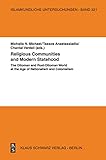Religious communities and modern statehood : the Ottoman and post-Ottoman world at the Age of nationalism and colonialism / Michalis N. Michael, Chantal Verdeil, Tassos Anastassiadis (Eds.)
نوع المادة : نصالسلاسل:Islamkundliche Untersuchungen ; Band 321تفاصيل النشر:Berlin : Klaus Schwarz Verlag, cop. 2015وصف:(320 p.)تدمك:
نصالسلاسل:Islamkundliche Untersuchungen ; Band 321تفاصيل النشر:Berlin : Klaus Schwarz Verlag, cop. 2015وصف:(320 p.)تدمك:- 9783879974436
- 953.03 23A
- 953
| نوع المادة | المكتبة الحالية | المجموعة | رقم الطلب | رقم النسخة | حالة | تاريخ الإستحقاق | الباركود | |
|---|---|---|---|---|---|---|---|---|
|
|
Bibliothèque centrale En accès libre | Collection générale | 953 / 1281 (إستعراض الرف(يفتح أدناه)) | 1 | المتاح | 000007699894 |
Over the last thirty years, historiography has amply illustrated the ways in which modern statehood is linked to a specific form of governmentality characterized by increasing social penetration and control of peoples' everyday daily lives. State tools included a variety of institutions, such as public education, mandatory military conscription, welfare and were served by complex bureaucratic organizations. As the Ottoman Empire was negotiating both its geopolitical survival and its own form of modern statehood, it tried to control the populations within its realm by instrumentalizing and simultaneously institutionalizing religious communities, thus producing an imperial state formation pattern that was both similar and distinct from other imperial or colonial projects. The existence of the religious communities and the functioning of the Ottoman state on their basis, made the passage from the Ottoman imperial structure to successor national and colonial states a complex process. This volume aims to explore various aspects of the communal organization in the Ottoman Empire for regions such as Asia Minor, Middle East and the Balkans, and to present the changes that occurred within the religious communities during the nineteenth century and particularly during the period running from the Tanzimat reforms to the First World War. Some of the key questions tackled in this volume are: How does the Sublime Porte understand the process of structuring a modern state with respect to religious communities? Who is responsible for modern institutions and why? Are religious actors being re-active or pro-active to the evolutions taking place on the state realm? Is the institutionalization of the religious communities best understood through a top-down institutional approach or thanks to a bottom-up analysis of the various agents' strategies and interests? What is the legacy of the Ottoman debates and institutions once a territory has transformed into a national or colonial frame
لا توجد تعليقات على هذا العنوان.


